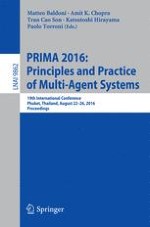2016 | OriginalPaper | Chapter
Spread of Cooperation in Complex Agent Networks Based on Expectation of Cooperation
Authors : Ryosuke Shibusawa, Tomoaki Otsuka, Toshiharu Sugawara
Published in: PRIMA 2016: Principles and Practice of Multi-Agent Systems
Publisher: Springer International Publishing
Activate our intelligent search to find suitable subject content or patents.
Select sections of text to find matching patents with Artificial Intelligence. powered by
Select sections of text to find additional relevant content using AI-assisted search. powered by
